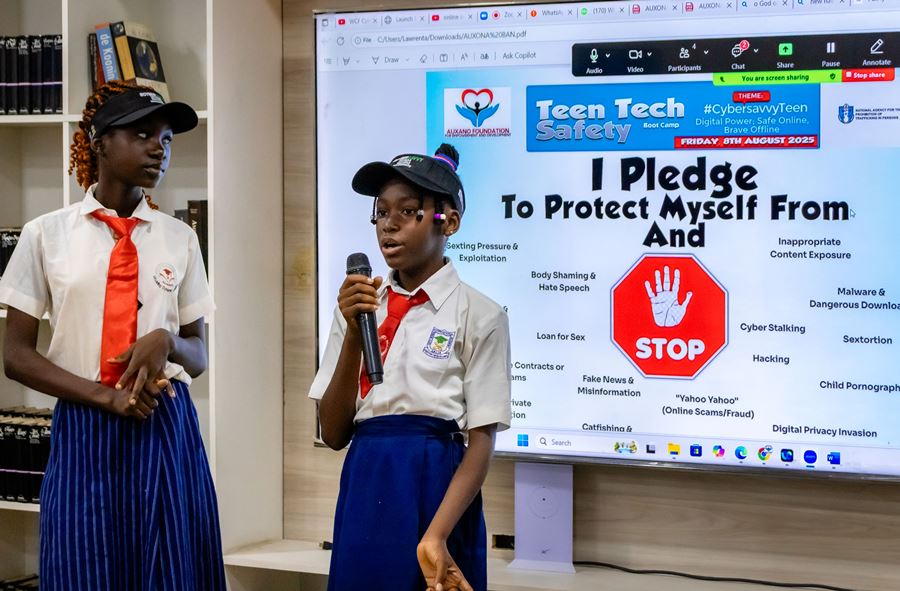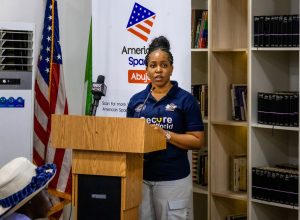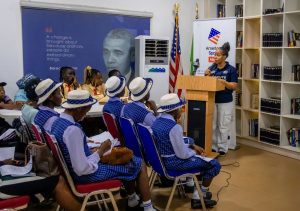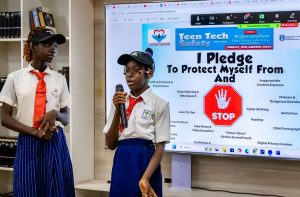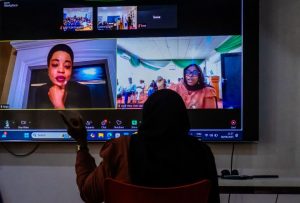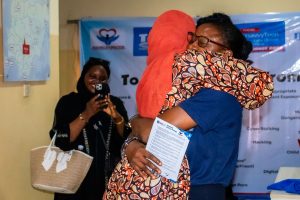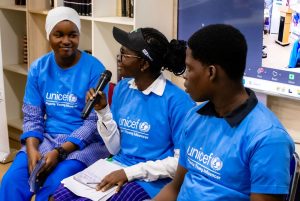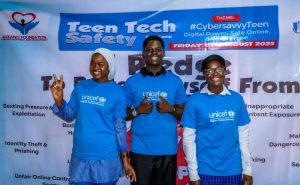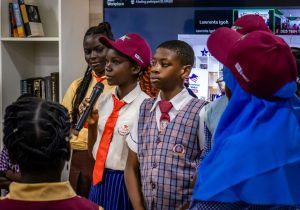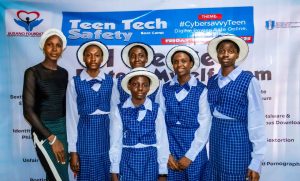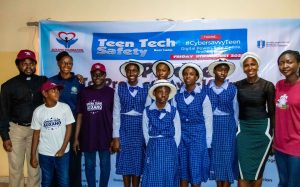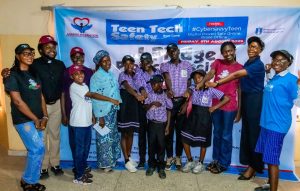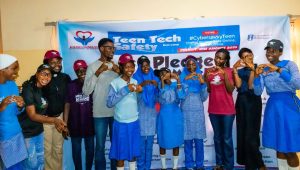Abuja, Nigeria — At a time when online exploitation, sextortion, and technology-facilitated trafficking are on the rise, 68 students from 12 secondary schools across the Federal Capital Territory (FCT) came together on Friday, August 8, 2025, for a one-day Teen Tech Safety Boot Camp at the American Space, Wuse Zone 4, Abuja.
The event, themed #CyberSavvyTeens: Digital Power, Safe Online, Brave Offline, was organised by the Auxano Foundation for Empowerment and Development (AFED) in partnership with the National Agency for the Prohibition of Trafficking in Persons (NAPTIP) and American Space Abuja.
Auxano’s Drive: Protection, Prevention, and Empowerment
For years, Auxano Foundation has stood at the forefront of Nigeria’s anti-trafficking movement. Entirely volunteer-led, the foundation not only provides rescue and rehabilitation services but also platforms where survivors can heal and lead. Its Survivors’ Leadership Forum has become a safe space for over 100 survivors from NAPTIP and partner shelters nationwide to share experiences, build confidence, and develop leadership skills.
Auxano’s prevention efforts are equally robust. Through school sensitisation campaigns, human trafficking awareness programs, and digital safety talks, it has pioneered age-appropriate engagements in schools across Nigeria. It also mentors NAPTIP-ATIPVAP clubs (Anti-Trafficking in Persons and Violence Against Persons) — giving students the tools to fight trafficking from within their communities.
The Boot Camp was conceived as a response to what organisers described as a “silent but rapidly escalating crisis” — the exploitation of children and teenagers through technology. Figures from the Nigerian Cybersecurity Emergency Response Team (ngCERT) reveal that more than 54,000 Nigerians, including minors, were targeted in sextortion cases between October 2024 and March 2025. NAPTIP also received 579,009 cybercrime tips in 2024 alone, with more than 6,000 related to sextortion and trafficking involving children.
“Our goal is to equip teenagers with the tools to recognise, resist, and report online exploitation,” the Convener explained. “This is not just about technology — it’s about protecting their futures.”
A Spirited Beginning
The day opened with prayers, followed by a warm and energetic welcome from Kosi Peace Asogwa (13), Teenage Ambassador of Auxano Foundation and member of the UNICEF Young Influencers Network. She described the Boot Camp as “a bold and important gathering that brings together young people to stand for safety, leadership, and digital responsibility.”
Kosi, who had earlier in the year trained at the UN House as part of her UNICEF Young Influencer role, explained that the event formed part of her peer-led action plan. She laid out the day’s learning goals: recognising online dangers like grooming and sextortion, using AI tools responsibly, spotting misinformation, and building confidence in digital spaces.
Acknowledging the efforts of mentors and partners, she paid tribute to Rev. Fr. Williams Orbih, PhD, who travelled from the United States “because he deeply believes in the power of young people to change the world,” and Mrs. Maya Sermento, who joined virtually from California to educate on sextortion. She also welcomed teen guest facilitator Tsyros Tolliver, who joined from Mississippi to share lessons learned from his father about safety.
She extended gratitude to UNICEF peers, Auxano mentors — “the chief hosts and organisers of this Boot Camp” — and American Space Abuja for generously providing the venue. To the students, she declared: “Let us remember why we are here — to learn, to lead, to rise, and to protect ourselves and others. Let’s be cyber-savvy teens: safe online, brave offline.”
Unmasking Sextortion
One of the day’s most sobering sessions was delivered by Mrs. Sharline Maya Smith Sarmento, trauma-informed scholar-practitioner at the AYAH Mind and Body Connection Centre (California, USA).
She began with the Pantosaurus Five Rules for Staying Safe, recited by two Auxano children, Freda and Dorcas, before presenting alarming statistics: between 2024 and 2025, sextortion cases in Nigeria rose by 30%, with teenagers aged 14–17 most affected. “Children aged 11–15 are the most vulnerable,” she warned, “because these ages are easily groomed and exposed to online risks, especially through social media.”
Mrs. Sermento outlined the common tactics predators use: grooming, flattery, compliments, deception, and eventually threats and blackmail. She cautioned that predators often exploit apprenticeship schemes and social media platforms to reach victims. “Sextortion is not just inappropriate behaviour; it is a crime,” she said firmly. “Parents must do better — know who your child is talking to, put a face to the names, set boundaries for online use, and ask the hard questions.”
She also urged parents and caregivers to look out for red flags like sudden isolation or forgetfulness in children. “Talk to your children early, talk to them often, and never assume they know how to protect themselves.”
Her final advice to teens was both practical and empowering: “If you cannot talk to your parents, find someone you trust — a teacher, someone in your church, or report to the Auxano team. There is always someone who will listen.”
Resilience and Bravery
Rev. Fr. William Orbih, PhD, delivered a powerful session on resilience and courage. “Be brave, be smart, and be resilient — both online and offline,” he urged, highlighting that courage to speak up is vital in both digital and physical worlds.
He posed a reflective question to the participants: “What line resonates with you, and what will you commit to changing because you participated in the Teen Tech Safety Boot Camp?”
The responses were heartfelt:
- “Being respectful does not mean accepting disrespect — I will only do what I know is right.”
- “I will be brave and not allow anyone to silence me.”
- “Even as a child, I have a voice, and I will speak up for myself and others.”
Inspired by the novel The Girl with Louding Voice, many pledged to live with resilience and courage, just like its protagonist. Fr. Orbih closed by charging the students to return to their schools and communities as champions of dignity, respect, and fearless self-expression.
Knowing the Law
Mr. Fernandez Marcus-Obiene, Special Assistant to the President on Justice Sector Reform, ICT, and Digital Innovation, delivered the official opening address. He urged students to understand both their rights and responsibilities in the digital age.
He highlighted three key legal protections: the Child Rights Act, Cyberbullying Laws, and the Nigeria Data Protection Law. Quizzing the students on artificial intelligence, he reminded them: “AI makes mistakes. Always verify the information you get online.” He also warned against unsafe online behaviors such as sharing photos in ways that expose personal data, stressing, “If you must do it, face your fingers toward yourself.”
He demonstrated how to check the authenticity of AI apps using “ChatGPT” as an example, stressing the importance of reviewing logos, names, and ratings before downloading. On unsafe picture-sharing, he advised: “If your friend refuses to delete your photo, report it immediately — to parents, to authorities. Don’t handle it alone.”
His message was clear: the more time spent online, the more vulnerable teens become to both misinformation and manipulation.
Practical Digital Skills
NAPTIP’s Social Media Manager, Mr. Johnson Nkanjha, shared real-life cases of teens lured by traffickers through false friendships, romance scams, and fake job offers. “If you don’t know them in real life, you can’t truly trust them online,” he cautioned, before introducing NAPTIP’s iReporter App for safe reporting.
Mr. Lawal Eneye, a seasoned tech educator, introduced AI tools such as ChatGPT, Grok, and Claude, demonstrating both their usefulness and risks. He reminded the teens: “Your decisions shape your actions, your actions shape your habits, and your habits shape your future.” A debate followed on whether AI is good or bad for teens — sharpening critical thinking and reinforcing responsible technology use.
Representing the Federal Ministry of Justice Joint Case Team on Cybercrime (JCTC), Mrs. Leyii (Esq) explained the team’s work in investigating sextortion, grooming, trafficking, and fraud. She warned, “Every unreported case gives predators another chance. Your voice, your report, could save a life.”
Peer-to-Peer Learning
From abroad, teen guest facilitator Tsyros Tolliver gave one of the most personal sessions of the day. He recalled how his father, a U.S. security officer, regularly showed him and his brother videos illustrating online abuse, teaching consequences and safe responses. “My dad always says, before you click or post, think about the consequence — because every action online has a cost.”
Tsyros explained how apps and websites harvest data through cookies, collecting details like names, emails, and home addresses to sell or exploit. “WhatsApp and apps can collect data 100% — and they can use it to scam you,” he warned. He also flagged misinformation, hate speech, and violent content as real-world threats that can distort values and harm relationships.
Interschool Debate:
A lively debate on the motion “Technology: Making Life Safer or Riskier for Teenagers?” was one of the most engaging highlights of the Boot Camp. Spiritan International Girls’ Secondary School, speaking for the motion, argued that technology is making life riskier, pointing to the dangers of social media misuse, cyberbullying, online grooming, sextortion, and the silent mental health toll of digital dependency. They stressed that while technology appears convenient, it often exposes teenagers to exploitation and peer pressure that can have lifelong consequences. Auxano Team, On the opposing side, Abraham School of Solid Academy contended that technology, when properly managed, is making life safer and more productive for teenagers. They cited the benefits of digital learning platforms, AI-powered research tools, online safety apps for reporting trafficking and abuse, and social media networks that foster peer support and amplify advocacy.
The debate was judged by Barr. Mary Igoh, Mrs. Babatunde, and NAPTIP Teenage Ambassador Maryam Babatunde, who praised both teams for their eloquence, confidence, and well-researched arguments. After careful deliberation, the panel declared Spiritan International Girls’ Secondary School the winners, commending their depth of analysis and ability to connect the risks of technology with the lived realities of Nigerian teenagers. In her closing remarks, Barr. Igoh reminded the students: “Technology is neither good nor bad in itself — it is the way we choose to use it that determines whether it becomes a tool for empowerment or a weapon for harm.” The judges agreed that the debate not only sharpened the participants’ public speaking and critical thinking skills but also captured the very essence of the Boot Camp’s theme: safe online choices and responsible digital citizenship.
Honouring Human Dignity
A major highlight of the Boot Camp was the presentation of the Human Dignity Defender Award to Rev. Fr. William Orbih, PhD, in recognition of his passion and unwavering commitment to leading change and empowering young people across Nigeria and beyond. The award citation commended him for giving voice to the voiceless and restoring human dignity through his writings — most notably his influential poem “Whose Baby is Crying,” which has inspired awareness and action on the harsh realities of human trafficking among law enforcement officers, parents, teachers, students, and diverse communities. He was further recognised for founding the Literature for Liberation Book Club within the Survivors’ Rehabilitation Space, where books have become pathways to healing, hope, and courage. In receiving the award, Fr. Orbih was celebrated as a leader who boldly speaks the truth for God and humanity, urging others never to allow their voices to be silenced. His example continues to inspire a new generation of young Nigerians to live with resilience, dignity, and fearless compassion.
A Symbolic Pledge
The Boot Camp closed with one of its most symbolic moments: the Meaningful Online Safety Pledge, led by NAPTIP Teenage Ambassador Maryam Babatunde.
Each participant signed a pledge card featuring the Pantosaurus Five Rules and then painted their hands in bright colors, leaving prints on a giant banner. This mural of handprints stood as a powerful declaration: “We are cyber-savvy teens, safe online and brave offline.” For Auxano children, the exercise blended fun with responsibility, turning safety into a creative commitment.
Gratitude and Next Steps
In her closing remarks, the convener, Ms Lawrenta Igoh thanked partners and supporters — NAPTIP, NACAT, AMBCC, American Space Abuja, participating schools, survivors, parents, teachers, guardians, and Guest Facilitators — for their trust and collaboration. She also commended the dedication of the Programme Manager, Ele-Ojo Ochai, and other dedicated Team Volunteers for taking pleasure in noble deeds. “This is just the beginning,” she said. “We must keep the conversation going — in schools, in communities, and online — until safety becomes second nature for every Nigerian child.”
Asogwa Chioma Emmanuella
Media and Communication Department,
Auxano Foundation

